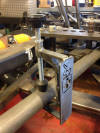|


This is our newest product
that has come to fruition. The idea
was planted by Larry Nickell, Senior Editor of
CRAWL Hardcore Offroad Magazine.
It is a fabrication tool that allows you to attach an angle
finder to round tube for bending. It is used to bend tube
or pipe for cages, exhaust, bumpers, any body armor products
like fender guards, tube steps, conduit, and much more!
-
Laser-cut from 0.50" mild steel
- Fits up to 3"
tubing
- Solid base for
magnetic angle finder
How it works:
Imagine laying a jump rope on flat ground in the shape of some
random squiggly line. We can then say that the axis of
that rope lies on a single plane. That single plane is
parallel to the ground, and runs through the center of the rope,
where the rope's axis is. Now pick up one end of the jump
rope so that about one third of the rope is not touching the
ground. We now have the rope's axis on two planes.
One still parallel to the ground, and the other at some angle
going up from the ground. Besides bending tube on a single
plane (part lays flat on the ground), we can bend tube on two or
more planes (part takes up a box or 3D-shaped volume in space).
To bend on a single plane, we never axially rotate the tube in
the bender. To bend on more than one plane, this involves
the axial rotation of the tube as we send it through the bender.
That is for what the plane of bend bracket is used; to measure
the axial rotation of the tube as we send it through the bender.
To do this, set the tube in the v-groove inside the C-shaped
bracket and screw down the threaded spindle to clamp the bracket
onto the tube. Use one of the outside flats for your angle
finder. Zero your angle finder at any initial angle that
you wish. All your angles are relative to each other, so
you can start at any angle. It doesn't have to be relative
to the ground.
Tips and Tricks:
Let's say for example you want to use a single piece of tube to
run along your 4-wheelers rocker panel as a rock slider, then go
up the front of the door to the A-pillar and up to the roof to act as
an exo-cage. This requires bending on multiple planes.
Instead of coping and welding multiple sections together, use
the plane of bend bracket to do it all in one piece.
Depending on how your particular bender is configured and
operates and if it is not level, your angle finder may change a
few tenths of degrees after each bend. You will want to
use the plane of bend bracket on the back side of the tube, the
end that gets bent last. During assembly, you must weld
the coupling nut on with the threaded spindle in the coupling
nut as the spindle will not go in or out once the nut is welded
to the bracket.
Purchase:
|
 |
Includes:
(1) C-Bracket
(1) Threaded spindle w/ rubber tip
(1) Knurled knob
(1) Coupling nut
|
|
|
